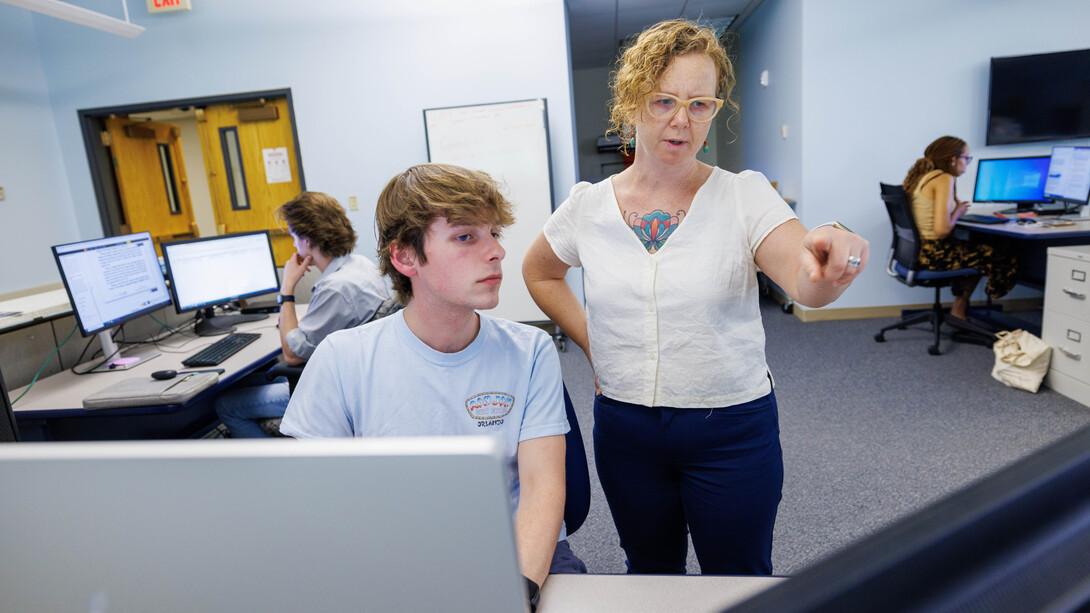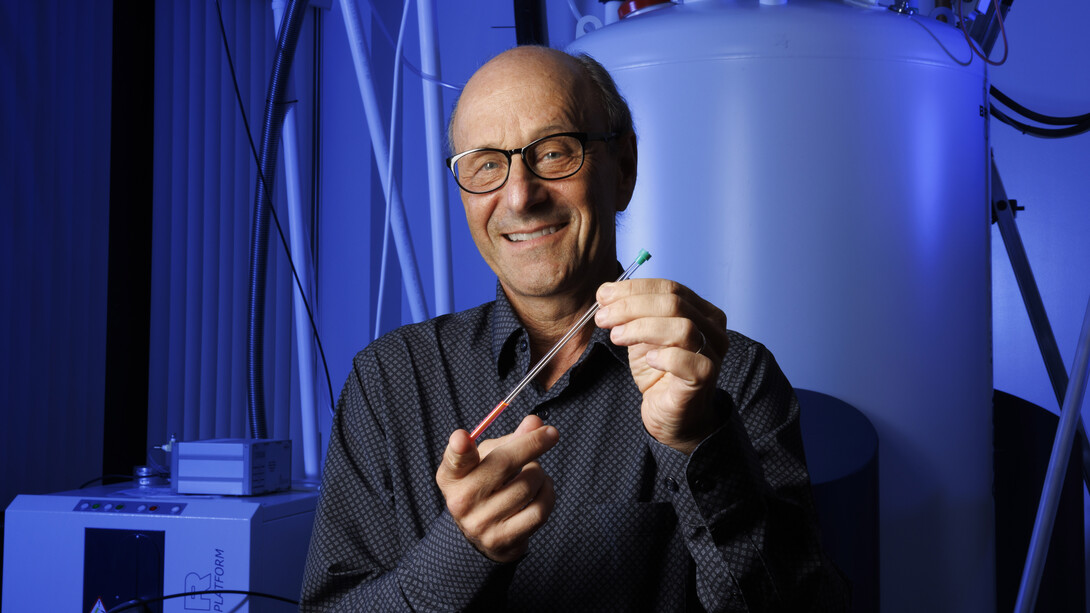
Tim Gay, Cather Professor of physics and astronomy, and colleagues recently solved a football physics conundrum: On a deep, well-thrown pass, why does the front tip of a football follow the ball’s trajectory, so that it points upward when launched but downward by the time it reaches a receiver? The answer lies in the combination of air resistance and the gyroscope effect.
Gay, author of “The Physics of Football” and a former Caltech player, enlisted the help of two theoretical physicists — his former teammate, Willie Moss of the Lawrence Livermore National Laboratory, and Richard Price of MIT — to answer the question. Their paper, “The Paradox of the Tight Spiral Pass in American Football: A Simple Resolution,” was recently published in the American Journal of Physics. The New York Times and Wall Street Journal highlighted the research.
Asked by the Journal if the findings could be used to make a quarterback a better passer, Gay said “potentially, yes.” Still, he cautioned: “It would not be a big effect. I don’t think this is going to in any way revolutionize the game of football. It might help a little bit.”
Gay also discussed football physics for an Oct. 22 KLKN story.
• • •
John Hibbing’s new book, “The Securitarian Personality,” was featured in an Oct. 1 column by The New York Times’ David Brooks. In the book, Hibbing, political science, argues that people on the right of the political spectrum tend to react to threats coming from outside America, while people on the left see threats coming from the powerful financial and political spheres inside America. “The Securitarian Personality,” based on reporting, focus groups and surveys, is an attempt to understand what motivates the most enthusiastic Trump supporters.
Hibbing was also interviewed for an Oct. 20 Bloomberg Government article on the increased attention being paid to state legislative races in the Midwest for the purposes of Congressional redistricting. With tighter legislative control in Nebraska, the Republican Party could redraw the state’s 2nd Congressional District to lock in an electoral vote for a Republican president, Hibbing said.
The 2013 book “Predisposed” by Hibbing and Kevin Smith, political science, and Rice University’s John Alford and a 2017 study by Ingrid Haas, also political science, were featured in an Oct. 26 Scientific American article on political neuroscience. In “Predisposed,” the authors argue that political differences are rooted in personality characteristics and biological predispositions. Haas put 58 people with diverse political views in a brain scanner and asked them questions about hypothetical candidates from both major parties. She found that liberals were more attentive to incongruent information, especially for Democratic candidates.
• • •
Kevin Smith, political science, was interviewed for an Oct. 10 article in The Hill on Nebraska’s 2nd Congressional District possibly playing a pivotal role in the 2020 presidential election.
Asked whether the single electoral vote might prove the difference, he said: “In previous presidential elections, my response has been ‘yeah, right.’ In 2020, who knows, it’s kind of a crazy year.”
• • •
Max Perry Mueller, classics and religious studies, was interviewed for an Oct. 2 Politico article on President Donald Trump alienating many of his former supporters in the heartland.
“These folks are not political ideologues,” he said. “They march in the March for Life, they vote Republican, but they are not enamored by the kind of identity politics that Trump brings.” However, he said the issue of abortion may prevent many Trump defectors from voting for Joe Biden.
• • •
Chigozie Obioma, English, was interviewed for an Oct. 3 segment on Blog Talk Radio. He discussed his second novel, “An Orchestra of Minorities.”
• • •
Dawn O. Braithwaite, communication studies, was interviewed for an Oct. 4 Deseret News article on government policies that could benefit American families.
Congress could provide “child care which protects children and facilitates the workforce in dual-career and single-parent families,” she said. But Braithwaite’s top priority is health care. “Preserving and expanding health care could not be more important for families,” she said.
• • •
Cara Burberry, Earth and atmospheric sciences, was quoted in an Oct. 7 National Geographic article on a new study of an ancient rockfall in Scotland.
“It does show you how much amazing detail you can pull out of one block of rock if you approach it really carefully,” she said. “They’ve documented it really beautifully.”
• • •
Bedross Der Matossian, history, is among 100 scholars of Armenian descent who have petitioned to stop Azerbaijan’s military aggression toward Armenians. The scholars were listed in an Oct. 12 Armenian Mirror-Spectator article.
Der Matossian was also interviewed for an Oct. 23 Le Monde Diplomatique article on the conflict.
“The anti-Armenian discourse fueled by both governments in Turkey and Azerbaijan and their military actions against the vulnerable Republic of Armenia are manifestations of genocidal tendencies of both authoritarian regimes,” he said.
• • •
Marc A. Garcia, sociology and ethnic studies, and colleagues have found that higher educational attainment among adults is associated with better cognitive function regardless of race and ethnicity, however whites are still living a greater percentage of their lives in good cognitive health compared to their Black and Hispanic counterparts. This suggests structural racism is playing a role, Garcia said. Home Health Choices, Medical Xpress and Technology.org ran articles on the research.
• • •
Carrick Detweiler, computer science and engineering, CEO and co-founder of Drone Amplified, wrote an Oct. 21 guest column for Fire Aviation on Congress considering banning all drone parts made outside of the United States.
“Instead, policymakers in Washington should set national standards that would apply to everybody, whether the technology is made in China, France or the United States,” he wrote.
• • •
New research from Matthew Van Den Broeke, Earth and atmospheric sciences, has found that the density of migrating birds is generally lower in the wake of isolated thunderstorms. The effect was more pronounced in the fall than the spring, suggesting that birds migrating north to their breeding grounds may be more likely to fly through storms for the sake of arriving on time. Technology.org ran an Oct. 27 article on the research.
• • •
The U.S. Department of Energy has committed $18 million to continue LaserNetUS, a high-power laser consortium that includes the Extreme Light Laboratory at Nebraska. Stories on the new grant funding appeared in KNEB, Photonics.com, Scienmag, Technology Today and several other media outlets.
• • •
Aila Ganic, a junior political science major involved with the College of Journalism and Mass Communications’ Climate Change Nebraska project, wrote an Oct. 28 article about being a young activist for Katie Couric’s Wake-Up Call newsletter.
“I scroll through Twitter and constantly see headlines about habitats we’ve ruined, animals that have gone extinct and humans whose lives have been destroyed by natural disasters,” she wrote. “This isn’t just an environmental problem, it’s a people problem.”
• • •
Jay Stafstrom, a postdoctoral researcher at Cornell University and Husker alumnus; and Eileen Hebets, biological sciences; co-authored a study showing that the ogre-faced spider relies on hearing, rather than its massive eyes, to catch airborne prey. CNN.com published an Oct. 29 article on the research. The story was picked up by more than 50 media outlets.
• • •
Aaron Duncan, communication studies, wrote an Oct. 29 piece for The Conversation on how Twitter’s structure allows “logical fallacies” to thrive. The article was picked up Fast Company, the Houston Chronicle, Snopes.com, Yahoo News and several other media outlets.
• • •
Yi Xuen Tay, alumna of undergraduate psychology, was featured in an Oct. 29 Chronicle of Higher Education article on the presidential election having personal stakes for international students. While she can’t vote, she encourages her American friends and classmates to get to the polls.
“Even if I don’t have the power to vote,” she said, “I still have a voice.”


